The war tried to kill us in the spring. As grass greened the plains of Nineveh and the weather warmed, we patrolled the low-slung hills beyond the cities and towns. We moved over them and through the tall grass on faith, kneading paths into the windswept growth like pioneers. While we slept, the war rubbed its thousand ribs against the ground in prayer. When we pressed onward through exhaustion, its eyes were white and open in the dark. While we ate, the war fasted, fed by its own deprivation. It made love and gave birth and spread through fire.
Then, in summer, the war tried to kill us as the heat blanched all color from the plains. The sun pressed into our skin, and the war sent its citizens rustling into the shade of white buildings. It cast a white shade on everything, like a veil over our eyes. It tried to kill us every day, but it had not succeeded. Not that our safety was preordained. We were not destined to survive. The fact is, we were not destined at all. The war would take what it could get. It was patient. It didn’t care about objectives, or boundaries, whether you were loved by many or not at all. While I slept that summer, the war came to me in my dreams and showed me its sole purpose: to go on, only to go on. And I knew the war would have its way.
The war had killed thousands by September. Their bodies lined the pocked avenues at irregular intervals. They were hidden in alleys, were found in bloating piles in the troughs of the hills outside the cities, the faces puffed and green, allergic now to life. The war had tried its best to kill us all: man, woman, child. But it had killed fewer than a thousand soldiers like me and Murph. Those numbers still meant something to us as what passed for fall began. Murph and I had agreed. We didn’t want to be the thousandth killed. If we died later, then we died. But let that number be someone else’s milestone.
We hardly noticed a change when September came. But I know now that everything that will ever matter in my life began then. Perhaps light came a little more slowly to the city of Al Tafar, falling the way it did beyond thin shapes of rooflines and angled promenades in the dark. It fell over buildings in the city, white and tan, made of clay bricks roofed with corrugated metal or concrete. The sky was vast and catacombed with clouds. A cool wind blew down from the distant hillsides we’d been patrolling all year. It passed over the minarets that rose above the citadel, flowed down through alleys with their flapping green awnings, out over the bare fields that ringed the city, and finally broke up against the scattered dwellings from which our rifles bristled. Our platoon moved around our rooftop position, gray streaks against the predawn light. It was still late summer then, a Sunday, I think. We waited.
